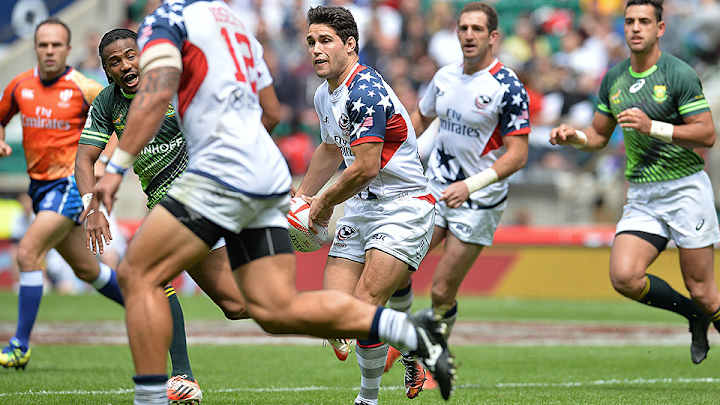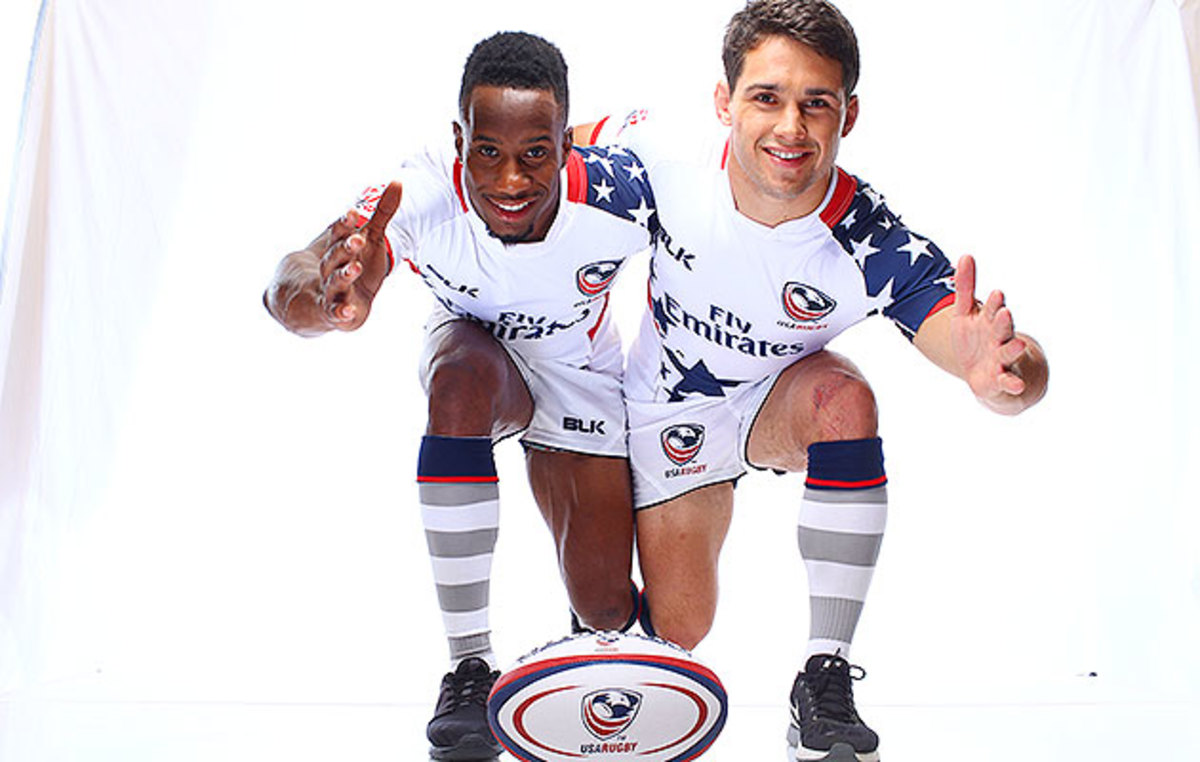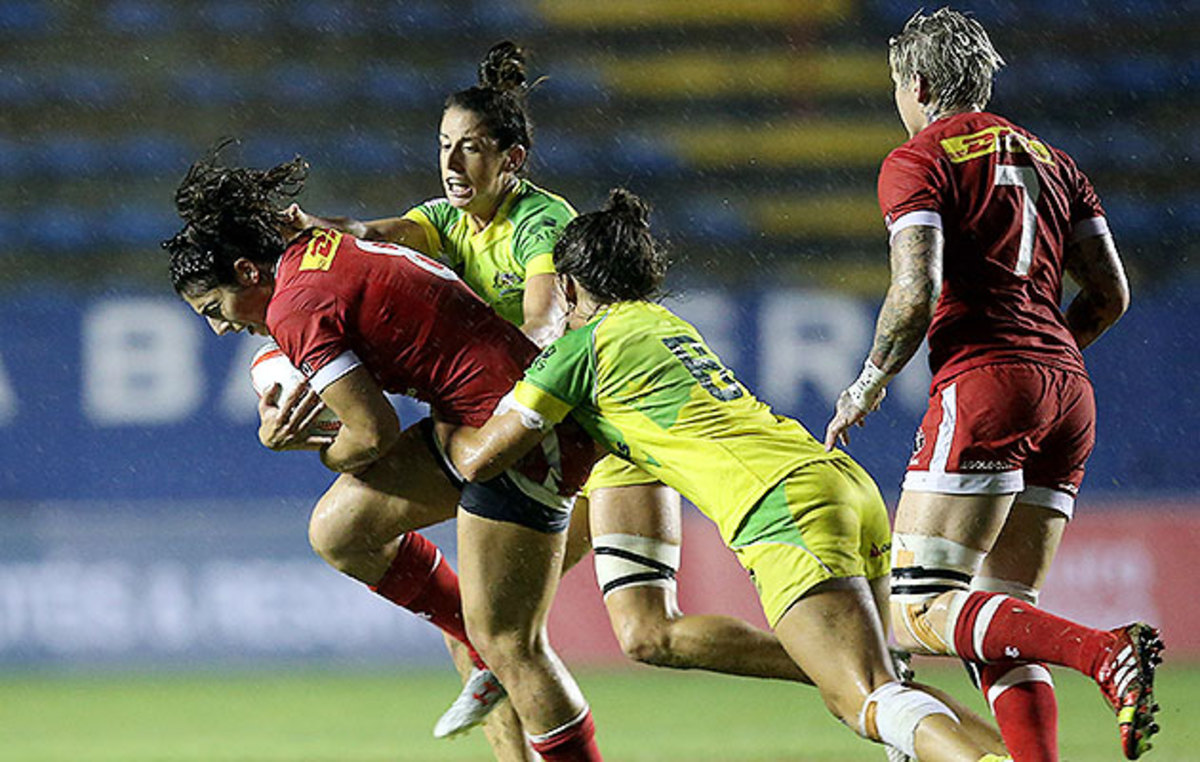Olympic preview: Rugby sevens making its debut at 2016 Rio Games

For six weeks, from the Olympics opening ceremonies to the Paralympics closing, men and women represent their country with one common goal in mind: Gold. Subscribe now for SPORTS ILLUSTRATED’s in-depth coverage. A version of this story appeared in the July 25, 2016 issue.
Ninety-two years after winning gold in Paris, the U.S. men’s rugby team will finally get to defend its title in Rio. This time the rules are different—rugby sevens rather than 15s—and the Games will include men’s and women’s tournaments. Despite past success, Team USA is not a favorite to take gold, but the men and women, which both finished sixth in the 2015–16 world series, might still be contenders for a medal in Brazil.
“The beauty of sevens,” says Remi Mobed, a senior physiotherapist with England’s Rugby Football Union, is that “it’s such a difficult game to predict, and it's going to be anybody’s for the taking.”
Played on a full-size rugby field at Deodoro Stadium, but with just seven players a side and seven-minute halves, the minnows can compete with the big fish. In 15s, Fiji’s men, for instance, rank No. 10, but they took their second straight world series sevens title in May. An island nation without a single Olympic medal will be the favorite to take gold in the men’s competition.
• RIO OLYMPICS PREVIEWS: Men’s basketball | Women’s basketball | Rugby |Diving | Tennis | Triathlon | Men’s soccer | Women's soccer | Field hockey | Sailing | Wrestling
A quick rugby sevens rules primer: seven players take the field for two seven-minute halves, with a twominute halftime. Teams earn five points for a try (similar to a touchdown in American football) and two points for a conversion, which must be drop-kicked and scored within 30 seconds after the try in sevens.
The men’s semifinals could be an exclusively Southern Hemisphere affair, with Fiji facing Australia and South Africa taking on New Zealand. After the first four rounds of last season’s world series, Fiji, South Africa and New Zealand were tied for first place, but pivotal losses by the Kiwis in the last three events meant the teams finished in that order. Fourth-place Australia struggled against the top three, with a combined 3-16-1 record.

Sports Illustrated At The Games
Subscribe to SI's Olympic podcast coverage



The U.S. men are led by captain Madison Hughes, who was born and raised in the U.K. He topped the 2015–16 world series in scoring with 331 points, edging South Africa’s Seabelo Senatla, who had 330. Sonny Bill Williams, a two-time World Cup winner with New Zealand’s 15s team, also switched for the Olympics, and his sister Niall plays on the Kiwi women’s team.
Barring major upsets, New Zealand and Australia’s women should make the semifinals, where they will likely face Canada and Great Britain. The Aussies, led by Emilee Cherry, only lost two games en route to the 2015–16 world series title, while runner-up New Zealand narrowly led its neighbor in total scoring, behind Portia Woodman’s 120 points. Woodman only switched to rugby, from netball, in 2012, but both her father and uncle were All Blacks.
• Usain Bolt wants nothing less than three more golds in final Olympics
Team GB—which includes players from England, Scotland and Wales—and Canada, which has the leading scorer of the world series in Ghislaine Landry (158 points), won tournaments this past season. Their head-to-head season record is tied at two wins apiece.
There are three pools of four teams each in both the men’s and women’s tournaments. The top two from each group plus the two best third-place teams advance to the quarterfinals. The U.S. women kick off their quest on Aug. 6, while the men, sharing a group with vaunted Fiji, begin against fifth-ranked Argentina three days later.
With 68 fast-paced matches played every half-hour over six days, rugby sevens could be the viral sensation of the Summer Games—like curling, only a bit more bruising.

Athletes to watch
Madison Hughes, USA
Hughes, who started playing rugby at age seven, has an English and an American mother; he could have represented either country, but opted to play for Team USA. His junior year playing college rugby Hughes was named Dartmouth captain, and his senior year he was named captain of the U.S. sevens team, leading the U.S. to victory in the London round of the world series. The year after that, the 2015-16 world series, he outscored everyone (331 points) and outkicked everyone (108 conversions). If he can continue that progression at Rio, the U.S. might well head home with a medal.
Seabelo Senatla, South Africa
Senatla finished the Rugby Sevens World Series just one point behind Hughes in overall points, and comfortably ahead on tries—he scored 66 tries, 18 more than his closest competitor, American Perry Baker. The winger was also named alongside forward, and fellow South African, Kwagga Smith to the HSBC Rugby Sevens Series Dream Team for the second successive year. Only world series champions Fiji shared the honor of having two players named to the Dream Team. Senatla is one of the fastest players in the game, and should South Africa meet the US in the knockout round of the competition, fans might be treated to a sprint race between him and American Carlin Isles. Senatla’s 100-meter best is 10.6 seconds, Isles’s record is 10.2.
• Financial and emotional impact of barely missing the Olympic team
Sonny Bill Williams, New Zealand
The Williams family will be twice represented in Brazil, Sonny Bill playing for the Kiwi men’s team and Niall, one of his younger twin sisters, on the women’s team. Williams has already made a name for himself among Kiwi sports fans. He is a two-time rugby union world cup winner with the All Blacks 15s team (New Zealand 2011 and England ’15), was named the rugby league International Player of the Year in ’13, and is undefeated as a heavyweight boxer in seven fights. At the 2015 world cup final, Williams gave his winners medal away to a 14-year-old fan who rushed the field. In January, Williams switched to training with the sevens team on a quest to become an Olympian.
Ghislaine Landry, Canada
Landry led the overall points table in the sevens world series for the second year running last season (158 points), scoring 19 tries and successfully kicking 30 of her 41 two-point conversion attempts. The 28-year-old Canadian started playing rugby when she was 14, and made her national debut five years ago. Her team has finished only second of third all four years of the women’s sevens series, which started in 2012, but tasted gold-medal success at last year’s Pan American Games. This past season Landry was the only Canadian, and one of just three non-Kiwi players, picked to the Dream Team.
• Water polo a family affair for Rio-bound sisters Makenzie, Aria Fischer
Portia Woodman, New Zealand
Black Ferns wing Woodman only switched to playing rugby full-time, from netball, in 2012. But she could hardly avoid playing rugby as a kid growing up in New Zealand—where the sport is a national obsession—and both her father, Kawhena, and uncle, Fred, were former All Blacks. In 2013 she won the rugby sevens world cup with New Zealand in Russia, and in ’15 was named the World Rugby Women’s Sevens Player of the Year. For two years running she has trailed Landry in total points, but led the Canadian in tries scored. (Last season Woodman scored 120 points and 24 tries.) Woodman was picked in the Dream Team in both 2014-15 and ’15-16.

Matchups to watch
Women
USA vs Fiji, Saturday, Aug. 6 at 1 p.m. E.T.
Australia is the clear favorite to finish first in Pool A, having lost just two games in the 2015-16 world series. But the battle to finish second in this group will be between the USA and Fiji. The losers are still likely to move through into the quarterfinals as one of the two best third-placed teams, but should the USA finish second out of those third-placed teams it may have to face Australia twice within less than four hours.
Canada vs Great Britain, Sunday, Aug. 7 at 12:30 p.m. E.T.
England and Canada are the only two other countries besides Australia to have won world series tournaments this past season, and the only two to have notched up wins against the Aussies. Their head-to-head season record is tied at 2-2, and this game looks certain to determine who finishes top of Pool C. The biggest unknown is what will happen when Scottish and Welsh players are thrown into the mix with the English to create Team GB.
• Durant keeping calm amid his crazy summer with Dubs, Team USA
Men
Fiji vs USA, Wednesday, Aug. 10 at 1:30 p.m. E.T.
The top-seeded Pacific Islanders will be clear favorites to win this game and finish atop of Pool A. However, the Americans might be riding high after big wins on the final day of the world series. On May 22 in London, the USA beat both New Zealand (42–14) and Fiji (26–19). If the American players can defeat Fiji again in this game they could top their group and secure a much easier route through the knockout stages.
South Africa vs Australia, Wednesday, Aug. 10 at 11:30 a.m. E.T.
The Blitzboks hold a 6-2 record this past season over Australia, their closest challengers in Pool B. The South Africans and Australians were ranked No. 2 and No. 4, respectively, in the final world series standings. Whatever happens in this game, both teams are certain to progress, but this is the closest group-stage matchup between teams that might be able to go all the way in Brazil.
Gold-medal dates
Women’s tournament: Monday, Aug. 8 at 7:00 p.m. E.T.
Men’s tournament: Thursday, Aug. 11 at 7:00 p.m. E.T.
